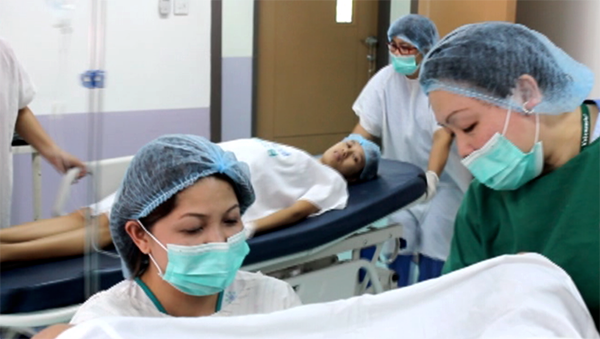
|
IN THIS PHOTO:
|
|
SPOTLESS CLEAN
The delivery room of the lying in clinic at Polo 3S Center. The city government runs seven lying in clinics across Valenzuela where the public can avail complete, affordable and safe maternity services. |
| View Gallery |
|
IN THIS PHOTO:
|
|
HAPPY START
Baby Ma. Hera Alejandria receives welcome cuddles from her parents at the lying in clinic in Polo 3S Center, in this December 2015 file photo. Her mother, Shany Porto, availed of the maternity services of the facility where she safely delivered her second child. |
| View Gallery |
|
IN THIS PHOTO:
|
|
YOU'RE IN GOOD HANDS
Geraldine Magcalog (center), midwife and officer-in-charge of lying-in clinic at the Polo 3S Center. The city government has seven lying in clinics: Balubaran, Canumay West, Lawang Bato, Mapulang Lupa, Paso de Blas and Polo. |
| View Gallery |
|
IN THIS PHOTO:
|
|
CROSSPOINT
A screengrab showing the climactic point of the fictitious story of expectant mothers Lyla and Pilar who made contrasting choices in marriage and in pregnancy. |
| View Gallery |

|
IN THIS PHOTO:
|
|
TELESERYE MAGIC
A screengrab from 'Bigkis' short film showing fictitious expectant mothers with their onscreen partners, Pilar (left) and Lyka who made contrasting choices in marriage and in pregnancy. |
| View Gallery |


Expectant mothers in Valenzuela City are learning about healthy pregnancy from Lyka and Pilar.
Lyka and Pilar are the leads of Bigkis, an original short film produced by the City Health Office to promote regular prenatal checkups and deliveries at lying-in clinics and hospitals.
The department’s Health Education and Promotion Office has been making the rounds of barangay health stations in the city, screening the 10-minute film before audiences of pregnant women.
Bigkis alternates the fictional story of two young pregnant women preparing for their impending deliveries with commentaries on healthy pregnancy by the department’s doctors. Services for mothers − family planning counseling, prenatal checkup, and delivery at lying-in clinics and hospitals− are also presented in the film.
Played respectively by CHO nurses Lyka Ambabag and Pilar Bernadette Velilia, Lyka and Pilar are childhood friends who would grow up to make contrasting choices in marriage and in pregnancy.
They are separated in adolescence when Lyka marries at the age of 15. Unable to pursue higher education, Lyka fails to recognize the value of family planning and professional medical care, skipping prenatal checkups in all of her eight pregnancies.
On the other hand, the college-educated Pilar goes through her own pregnancy with more prudence than Lyka does and has regular prenatal check-ups until she gives birth at a hospital.
Lyka chooses to give birth to her eighth child at home, attended only by a hilot, a traditional birth attendant. She is transferred to a hospital when after a long labor the baby still would not come out. The two young mothers are then reunited in the most unexpected of places: the delivery room.
The doctor then tells her husband that Lyka’s uterus continues to bleed even after delivery, a condition known as uterine atony. Her life is in danger.
Millennium Development Goals
The short film is part of an information campaign to reduce maternal and infant mortality rates, which are among the eight Millennium Development Goals set by the United Nations.
By 2015, member countries, such as the Philippines, should have brought down the maternal death rate of 380 per 100,000 live births by three-fourths; and the 12.7 million of deaths among infants under 1 year in 1990, lessened by 2/3.
In Valenzuela City, the highest number of maternal deaths in the last seven years was recorded in 2010, with 10 deaths out of 8,799 live births, or around 114 per 100,000 live births.
This figure would steadily decline in the next four years, with 2 deaths out of 7,799 live births recorded in 2014, which translates into 25.64 per 100,000 live births, according to the City Health Department’s Field Health Services Information System Annual Report 2014.
On the other hand, the infant mortality rate in the last seven years was also highest in 2010, hitting 159, or 18.07 per 1,000 live births. The figure for 2014 was 101, or 12.95 per 1,000 live births.
Wrong beliefs
To convey its message to their audience, however, the CHO wanted more than a straightforward lecture.
“Many mothers are fond of soap operas,” said HEPO head Maria Pia Dizon. “That’s why we used devices common to the genre, such as confrontations and cliffhangers.”
Dizon said the research for the film showed that many mothers are misinformed about pregnancy. Like Lyka, these mothers still believe in superstitions. For instance, the superstition that wearing a bigkis, or cloth belly binder, would protect the mother’s heart from the unborn baby’s kicks remains prevalent.
“[The title] Bigkis could also mean wrong beliefs that bind the mind,” Dizon said.
Besides running a vigilant information campaign, the city government has also built four additional lying in clinics in the past two years, bringing the total to seven. These seven facilities are in Balubaran, Canumay West, Lawang Bato, Mapulang Lupa, Marulas, Paso de Blas and Polo.
 Latest News
Latest News Archive
Archive Category
Category

